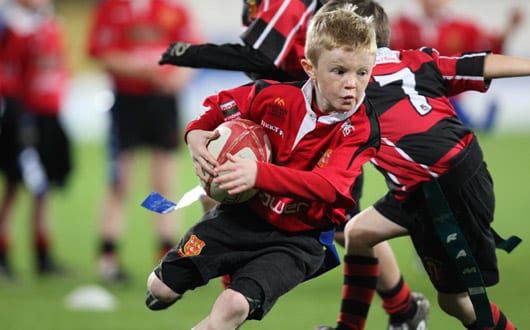2nd March 2016 – could this date be a watershed moment in rugby across the British and Irish isles? More than 70 doctors and medical academics have called for a ban on tackling in rugby matches played in schools in UK and Ireland, citing injuries such as “fractures, ligamentous tears, dislocated shoulders, spinal injuries and head injuries”, all of which can have “short-term, lifelong and life-ending consequences for children”.
However, having played rugby at school, I’m a supporter of keeping full-contact tackling within school rugby, and here’s why.
Inclusiveness
Perhaps the aspect of rugby that the sport should be most proud of – it is a game that has a use for all shapes and sizes. Being large and powerful, or small and quick are both useful in equal measures in different positions, meaning there is a place for everyone. However, if tackling were to be banned there is no doubt that speed would take precedence, potentially alienating certain people from the game. Ask yourself this question – in a game of tag or touch rugby, would you pick the 6ft5, 20st Andrew Sheridan, or the elusive trickery of 5ft7, 12st Shane Williams?
Long-term safety
Safety of young people playing rugby is clearly the most important factor in any of these arguments. However, teaching secondary school children the safety of tackling from a younger age is arguably far safer than introducing contact to more physically developed players when they are older, stronger, and heavier. Former England hooker Brian Moore argued this point, when he tweeted “Banning contact rugby til age 18 effectively precludes full rugby after; it’s more dangerous to start unskilled, powerful adults tackling.”
Technique
Tackling in rugby is an art form, that when performed correctly can allow the smallest players on the pitch to stop the largest. Just look at when Matt Banahan tried to run over Shane Williams – a man who was a full foot shorter and 35kg lighter.
[youtube height=”HEIGHT” width=”WIDTH”]https://www.youtube.com/watch?v=CWdn8Adt7P8[/youtube]
If tackling was removed from the game at youth level then enjoyment levels, and possibly spectator numbers, would drop – in what other sports could this match-up lead to the smaller player coming out on top? However there is a case that technique could be taught better from a young age or as Owen Slot from The Times recently said: “Rugby could redraw the tackle law by demanding a lower tackle line”. Either way, good technique is vital to the safety of the game.
Statistics
When it comes to contact sports, there is always an element of risk. This applies across any of them – whether it is boxing, football, or rugby. However, CW Fuller wrote on the risks of sustaining a permanently disabling injury whilst playing rugby, and his evidence showed that it is “generally lower than or comparable with the levels reported for a wide range of other collision sports, such as ice hockey, rugby league and American Football. In addition, the risk of catastrophic injury in rugby union was comparable with that experienced by most people in work-based situations and lower than that experienced by motorcyclists, pedestrians and car occupants”.
Ditching age categories
It’s well-documented that school rugby in New Zealand is separated by weight, rather than age. This reduces the risk of mis-matches in size which can cause players to be hurt, as larger players will not be able to run over smaller ones. On top of this, it also encourages players to focus on ball skills and evading tackles, as raw power is not as effective at beating people who are the same size as you.
There is a reason that New Zealand’s forwards in particular are far more comfortable on the ball than their Northern Hemisphere counterparts, which in turn can go some of the way to explaining why they’ve won the last two World Cups…
So there you have it – tackling in rugby may not be perfect and as per my points above, I agree that some modifications may have to be made to the game to keep it safe. However banning it entirely seems to be an extreme measure: but maybe that’s the point of the petition as only something this extreme will get people talking and debating the subject, which is what we’ve been doing today at Performance Towers.


















